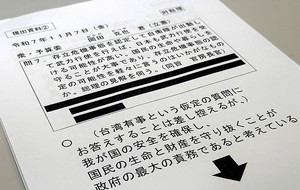August 2, 2023 at 15:00 JST
 Nobuyuki Baba, head of Nippon Ishin (Japan Innovation Party), meets reporters in Tokyo on July 26 following remarks he made about the Japanese Communist Party. (Asahi Shimbun file photo)
Nobuyuki Baba, head of Nippon Ishin (Japan Innovation Party), meets reporters in Tokyo on July 26 following remarks he made about the Japanese Communist Party. (Asahi Shimbun file photo)
Each political party adheres to its own basic belief and policy. But since the fundamental principle of democracy calls for all parties to represent the Japanese people collectively, they accept one another and work around their differences through reasoned discourse.
Any party that rejects this principle and attacks a rival in a strongly worded statement risks undermining the very basis of democracy, which is to seek a consensus through debate on the premise that different political parties have their own values and interests.
Nippon Ishin (Japan Renovation Party) leader Nobuyuki Baba went after the Japanese Communist Party during an online news program last month, saying Japan would be “better off without the JCP” and dismissing its members as “people who are seriously thinking of creating an impossible fantasy world."
When the JCP demanded a retraction, Baba dug in his heels with the retort, “I only stated my conviction as a politician.” He went on to state that the JCP is “not an ordinary political party” because it remains subject to investigation by the Public Security Intelligence Agency under the 1952 Subversive Activities Prevention Act.
In the Upper House election last year, the JCP captured 3.61 million votes, or 6.8 percent of the total, in proportional representation constituencies.
Baba’s remarks effectively negated not only the party, but also the people who voted for it.
It is a fact that the JCP is still on the PSIA’s investigation list. The party has repeatedly pledged to promote social reforms if it ever gains a majority in the Diet.
Baba has also repeatedly attacked the Constitutional Democratic Party of Japan for its conduct in the Diet, vowing to “demolish it” in the next Lower House election.
If he is hoping to gain attention by using belligerent language, his lack of common sense is simply appalling. His behavior may well fan unnecessary confrontation and encourage divisiveness among the public.
The Constitution stipulates that Diet members represent “all the people.” As such, they are duty bound to heed the voices of not only their supporters, but also those who voted for other parties.
If Nippon Ishin aspires to become the No. 1 opposition party and eventually seize power, it needs to show its readiness to acknowledge a much broader segment of the public.
It is a fact that verbal skirmishes between political rivals are part and parcel of any political battle.
Slain former Prime Minister Shinzo Abe, who was more inclined than any other politician to use the “friend” versus “foe” pattern of confrontation, labeled the Democratic Party of Japan administration “nightmarish” and used that word often in his remarks on the Diet floor.
Naoto Kan of the Constitutional Democratic Party, who was prime minister when the Democratic Party of Japan held power, tweeted last year that Nippon Ishin reminded him of “Hitler’s Nazi Germany.” Nippon Ishin rightly objected to that.
Political parties need not pull any punches when debating a policy based entirely on facts. But when it comes to critiquing a rival party’s political position, it is not easy to determine the boundaries of permissible behavior.
In any case, politicians are expected to possess the broadness of mind to respect one another as colleagues who share the same goal of protecting the lives and livelihoods of the people to create a better society.
Exchanging words that verge on outright insults can only damage public trust in politics and politicians.
--The Asahi Shimbun, Aug. 2




















A peek through the music industry’s curtain at the producers who harnessed social media to help their idols go global.
A series based on diplomatic documents declassified by Japan’s Foreign Ministry
Here is a collection of first-hand accounts by “hibakusha” atomic bomb survivors.
Cooking experts, chefs and others involved in the field of food introduce their special recipes intertwined with their paths in life.
A series about Japanese-Americans and their memories of World War II